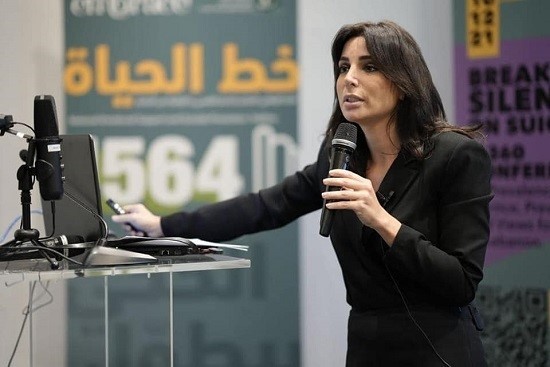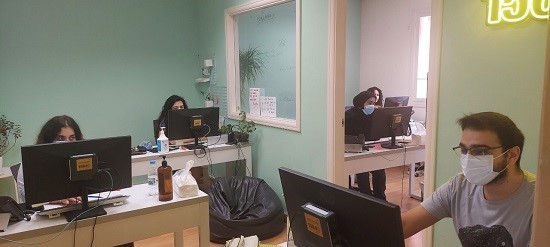BEIRUT — “There are wounds that are hidden and have not been
treated” is the assertion that “Embrace” makes in its latest compelling and
chilling video on Facebook. The Lebanese NGO is referring of course to
psychological wounds in its mental health awareness video.
اضافة اعلان
In the video, a young woman looks at a clock face and starts
to sweat as her heart races; she goes to a window and opens it. The time reads
18:08:18, the time the
Beirut Port blast ripped apart an entire city on August
4, 2020. She breathes deeply at the open window. The video illustrates just one
of several traumatic events the Lebanese have had to endure over the past two
years, enough to tax the hardiest among us.
 Mia Atweh addressing participants in awareness conference in December. (Photo: Embrace Lebanon Facebook page)
Mia Atweh
Mia Atweh addressing participants in awareness conference in December. (Photo: Embrace Lebanon Facebook page)
Mia Atweh, founder of “Embrace”, said that mental health is
top on international donor agendas for Lebanon, a country greatly lacking in
such services.
“At our center in Beirut, opened since August 2020, we have
a three-month waiting list, as demand for counseling is very high,” Atweh told
Jordan
News, adding that the organization ends up referring many people to other
centers.
“Keep in mind, we have not advertised this center, people
know about us only through word of mouth, if we advertise we would be
overwhelmed,” she said.
The center, located in Beirut’s Hamra district, has 16
clinicians seeing 350 patients during 700 sessions a month. Anyone who is in
need of counseling can go to the clinic that is completely free of charge.
“Counseling today is extremely unaffordable; at 700,000
Lebanese lira per session (minimum wage is still 600,000 lira per month), it is
out of most people’s reach,” Atweh said.
 (Photo: Embrace Lebanon Facebook page)
Embrace
(Photo: Embrace Lebanon Facebook page)
Embrace operates the National Emotional Support and Suicide
Prevention Hotline (1564) in Lebanon in partnership with the Ministry of Public
Health through its National Mental Health Program, one of the few public
programs not funded by the public purse, Atweh said. The hotline is a lifeline
for many people. It operates 21 hours a day, from 8:30am to 5:30am.
A population at high risk
Dr. Aimee Nasser Karam, head of clinical psychology at the
Saint George Hospital University Medical Center (SGHUMC), worries about the
Lebanese population at large and her own students at Balamand University who
want to stay and serve in Lebanon. She calls them her heroes.
“The exposure to stress is high and it has been too long, I
am worried for our people. It is really unfair, psychology cannot be thought of
outside human rights, and we are having difficulties securing basic rights,”
Karam told
Jordan News.
“It is not enough to ask someone if they are having suicidal
thoughts, these thoughts could be transient or they could be very serious,” Karam
said, adding that the Lebanese population as a community is going through
several traumas.
Anyone is prone to develop acute stress disorder as a result
of witnessing multiple traumatic events, and people can experience symptoms
that follow trauma, like reliving a traumatic event and experiencing it as if
it were happening at the moment, or feelings of fear and insecurity.
“Acute stress disorder can be a risk factor to developing
post-traumatic stress disorder (PTSD). After the port blast we (at SGHUMC) had
free open clinics for people to come in for consultations and to know how to
manage their symptoms,” Karam said.
 (Photo: Embrace Lebanon Facebook page)
(Photo: Embrace Lebanon Facebook page)
Immediately after the port blast, she said, was a time when
many Lebanese decided to leave the country in record numbers, out of feelings of
disgust, insecurity or powerlessness, fearing that anything could happen to
them and needing to escape.
How to identify a high risk of suicidality
Karam said that any change in behavior that is
uncharacteristic of a person, like being very quiet and uncommunicative,
avoiding activities, places, and friends, is to watch out for as it could
indicate high risk of suicidality.
“Some people start being more isolated, they do not want to
see anyone, they start restricting their lives, staying at home, they may have
unexplained crying spells, they do not talk much, have a feeling of
estrangement, and do not identify with others” she said.
As for how to respond to a loved one that shows such
behaviors, Karam said: “All we need to do is to show them that we are here for
them and that things could be processed differently, and that help is
possible.”
What should raise alarm bells are people who combine high
irritability and impulsivity with a high level of hopelessness, she said,
adding that these are very dangerous markers, and such people could be
“impulsive about suicide”.
“We should never underestimate the likelihood of this act
happening. Even if they just talk about it, we need to take it seriously,”
Karam warned.
“Sit with a person, find out how long they have been feeling
this way, how often this idea of suicide comes to them, determine if they have
a support system, anchors in their lives, significant others or not,” she said,
adding that people without a support system and significant others in their lives,
or who do not have a good relationships with anyone are at high risk.
The young are at highest risk
Atweh said that the hotline has been getting significantly
higher numbers of calls from children and adolescents reporting emotional or
physical abuse, which she said is expected when the adults are under enormous
stress.
“As we know, anything affecting children in their formative
years stays with them long term and has a tremendous impact on their
psychological wellbeing,” she said.
In fact, 61 percent of callers on the hotline are aged 18 to
34, and a full 50 percent are unemployed. The hotline has received just over
15,000 calls since it was first set up in 2017. This year alone, up to
November, the hotline received 7,959 calls.
“It is worrisome that the mental health of
Lebanese youth is
at risk, as they are the main drivers of the economy. This will impact their
performance at school or university,” Atweh said, adding that the lack of
coverage and the shortage of specialized hospitals and hospital beds in the
public health care sector for mental health makes Embrace’s job very tough.
Substance abuse, like alcohol, exacerbates the risk of
suicide, as does a history of suicidality, either thoughts of suicide or
previous attempts, as well as depression. Recurrent thoughts about suicide or
planning to do so are also risk factors.
A perfect storm of mental health issues
Karam said that in countries going through financial crises
like Lebanon, people are already at higher risk.
“In Lebanon, we have a perfect storm, a recipe for mental
health issues, a combination of stressors that take away people’s stability,”
she said.
“Anyone who did not have mental health issues before is
going to be impacted by what is happening,” Karam said of the situation in
Lebanon, where for two years, feelings of anxiety about the future and deep
sadness seemed to dominate.
She said that people focused on problem-solving spend less
time ruminating on their situation and are less prone to
mental health issues.
“Most people who see a sad movie will feel sad for a few
minutes or hours, but if someone already has depression, they could feel sad
for a week,” Karam said, adding: “When you are psychologically vulnerable or if
you have mental health issues, stress factors will impact you more severely.”
The mental health fraternity is trying its best under trying
conditions, but it is not enough, Karam said, adding that people have no access
to medication to treat their physical ailments, let alone their mental ones.
The feelings of insecurity the Lebanese experience
constantly is terrible, and the high level and long-term exposure to stress
exacerbates mental health issues. Add to these untreated physical ailments and
lack of access to basics, such as power and medicine, and the burden on mental
health becomes apparent.
Read more Health



